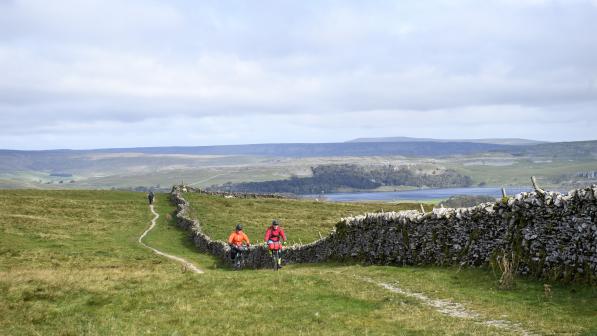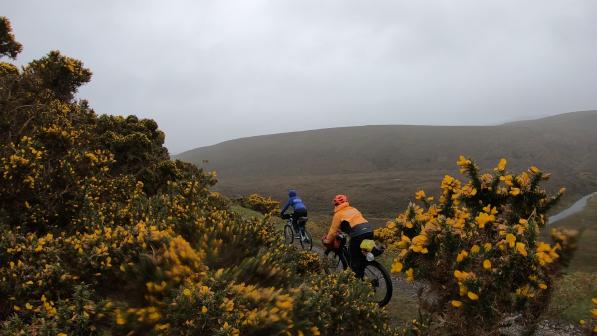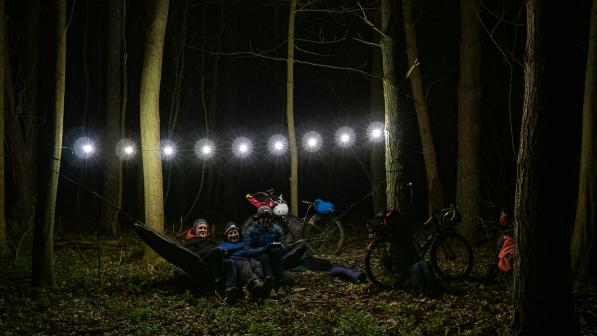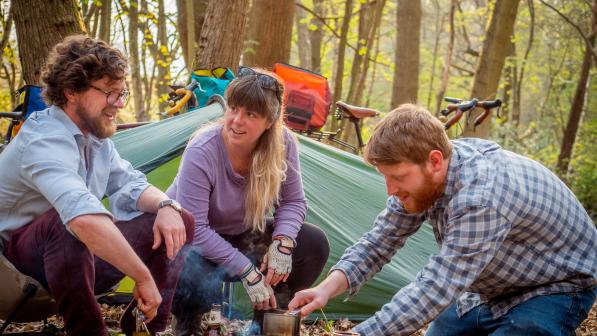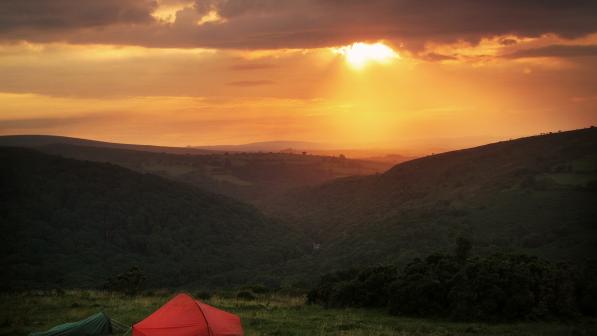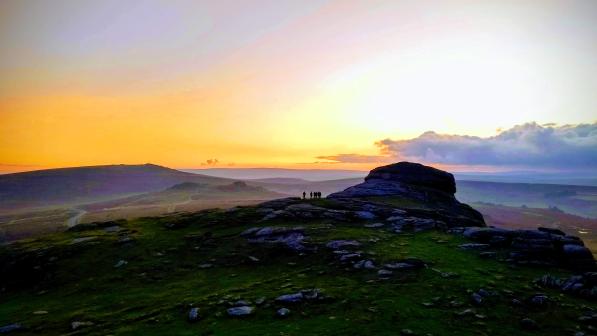No more wild camping on Dartmoor – what next for access in National Parks?

"This land is my land, This land is not your land, so please get off now or I'll go fetch the farm hand, and he will come running in a red cap-sleeve T-shirt, and a West Country smile that says 'I'll give you Kick Out The Jams' "
Get Kramer - Half Man, Half Biscuit
‘An attack on our rights’
Big news hit the world of countryside access on Friday. Following a two-day trial in December, the judgement in the case of Darwell vs Dartmoor NPA was released, ruling that the Dartmoor Commons Act of 1985 did not extend to allowing wild camping on the moor without landowner permission. Previously it had been widely accepted that this was a public right (unlike the rest of England).
Angry voices have said, variously, that it is ‘an attack on our rights to access and enjoy the great outdoors’, a ‘backward step’, and even resulted in a declaration of war.
In reality, the judgement was more like a sad lament of over seventy-five years of broken promises, obfuscation and delay.
A land fit for heroes
The post-war government of 1945-51 was visionary in its commitment to building a ‘land fit for heroes’. As part of that, the National Parks and Access to the Countryside Act of 1949 was enacted.
The Minister who introduced the bill to parliament said that countryside access was "as much a part of positive health and wellbeing as the building of hospitals", and that it was:
“a people's charter for the open air, for the hikers and the ramblers, for everyone who loves to get out into the open air and enjoy the countryside. Without it they are fettered, deprived of their powers of access and facilities needed to make holidays enjoyable. With it the countryside is theirs to preserve, to cherish, to enjoy and to make their own”.
There is perhaps a tendency to regard rambling as the only important recreation in National Parks
Report of the National Parks Committee, 1947
The original proposals also made it clear that National Parks were not just for walkers, commenting that:
“There is perhaps a tendency to regard rambling as the only important recreation in National Parks. Yet there must be many who most enjoy wild country when its beauty forms the setting for other forms of sport and recreation” and its authors envisaged “continuous routes which will enable walkers and riders to travel the length and breadth of the Parks, moving as little as possible on the motor roads”
In reality however, the delivery of these promises was patchy. It took until 2000 for Ramblers to secure, under the New Labour government, a ‘right to roam’ across common land and open moorland (on foot only). Even today only two of our fifteen National Trails are fully open for both walking and riding (an issue which Cycling UK has recently challenged in relation to the proposed new coast to coast route).
Of course, back in the 1940s, nobody (apart from maybe the Rough Stuff Fellowship) would have envisaged the sort of escape that mountain biking nowadays delivers for hundreds of thousands of riders - and it’s important that we remember that word escape, because it reminds us of the principles of that post war legislation, providing people, the workers, with an escape from the dark satanic mills and factory towns in order to enjoy the countryside. A chance to get away from the hustle and bustle of the towns and cities and connect with nature, to enjoy the sights and sounds of the countryside and rediscover ourselves, and to promote:
“a better understanding between town and country by giving the townsman a deeper comprehension of the significance of nature, an appreciation of country lore and an insight into the essential processes of primary production in which the countryman is engaged”.
National Parks were specifically created as places to walk, ride, and climb - places to swim and boat, and to stay locally too (either in B&Bs, tents, or the growing variety of affordable accommodation providers such as youth hostels), bringing a much-needed boost to the rural economy.
Where are we today?
Unfortunately, so many of these freedoms were never really delivered to the extent originally envisaged, or they have been gradually reined back in thanks to the increasing domination of motor vehicles. Our roads became increasingly unsafe, our communities dispersed, our railways closed, and our rural villages became increasingly dormitory, as employment in land-based industries fell dramatically (in 1841, over 20% of the UK workforce was agricultural, compared to just 1% today).
So you would have thought that mountain biking, this new escape to the country that would allow people to ride from their door and out onto the moors and other areas of the countryside, would have been embraced as the great leveller - a form of ‘rambling on wheels’ which facilitates healthy recreation, and an opportunity for people to better connect with the land (in a metaphysical sense, not just when they fall off).
But in fact, we’ve seen nothing but frustration and obfuscation. Our rights of way system limits us to just 22% of the recorded network. In some areas (including several National Parks) that proportion is much lower. You know what? That might not even be so bad if there was some real semblance of common sense behind it - if routes were designated according to their suitability rather than on the basis of who used them 200 years ago - but all too often we have an impassable quagmire of a bridleway, while a wide, solid footpath runs alongside, which riders are not supposed to use.
Even worse, we have over a thousand miles of disused railway lines, closed in the 1950s, and only a fraction of these are open to the public. These lines, inevitably running between and connecting towns and villages, and out into the wider countryside, with wide, well-drained linear routes, with gentle inclines… and bikes can’t use them. It’s crazy! We have examples where local communities have lobbied for years and years to get these routes opened up to the public without success - our rights of way system being so complex that local authorities simply avoid using it, or push the work to the bottom of the pile.
The situation with right to roam is no better: thousands of miles of well-surfaced vehicular tracks across open moorland and heathland where you can walk, or even in some cases ride a horse, but bikes? No way. From Dartmoor to the New Forest, and all the way on to the moors of the Peak District, Yorkshire and Northumberland, cyclists have limited rights to access the countryside - even leading many riders to dismiss ‘the law’ relating to access, and resort to applying common sense instead.
A future legacy
But common sense isn’t enough. Just like wild camping, many riders have said ‘well, they can’t stop me’, but the problem is that this ‘I’m alright jack’ attitude leaves no legacy for the riders of tomorrow. We’ll remain trapped in this everlasting cycle of a nudge and a wink as to where you can ride your bike, but, like the campers of Dartmoor, never secure in the knowledge that we won’t be pulled up for breaking the rules by the warden or gamekeeper. Always ferreting around in an ongoing subterfuge and unable to openly promote the best routes for people to use in order to get out there and enjoy the countryside themselves.
And just to be clear here, we’re discussing a right for responsible access. Nobody is defending ‘dirty camping or ‘fly camping’ (nor would we be defending irresponsible access or behaviour by bike or any other means), but there is a clear difference between that and the sort of responsible, ‘leave no trace’ backpack/bikepacking camping that so many people can, and do, enjoy on a regular basis, and which Cycling UK has promoted though our 12 nights out campaign for several years now.
But let’s not forget that the Dartmoor National Park Authority that went to court defending the right to wild camp, is the same Dartmoor National Park Authority which also intends to retain, and even reinforce, their almost complete ban on mountain biking (which applies even on well surfaced land-rover tracks).
To put that in context: there is a legal right to access the commons on foot and on horseback for the purpose of open-air recreation, and up until Friday wild camping was also seen as being included within that 'recreation'. This judgement now makes it a ‘potential trespass against the landowner’, whereas under the existing byelaws cycling is a criminal act that could result in prosecution in the magistrates court and fine.
Kicking the can down the road
Three years ago, Julian Glover authored an independent review of National Landscapes. This official report recommended that the government looks again at access rights in National Parks and Areas of Outstanding Natural Beauty (in many ways more important due to their proximity to many large conurbations). Glover commented that:
"The existing law and its application excludes many different user groups entirely, or favours walking on foot. We do not seek to undermine those rights; indeed we want to see walking further supported by national landscapes taking on rights of way management and the National Landscapes Service supporting National Trails. But it feels wrong that many parts of our most beautiful places are off‐ limits to horse riders, water users, cavers, wild campers and so on. We hope that as part of the government’s commitment to connect more people with nature, it will look seriously at whether the levels of open access we have in our most special places are adequate."
The government has, essentially, sat on those recommendations ever since. In January 2021 they commented, in their formal response to the Glover review that they would look again at open access rights, but failed to give a timescale. Late last year we were briefed (although this has not yet been formally published) that they would only look do this after the completion of the CROW access maps review (a task that itself has already been pushed back from 2013). The timescale for that is another three to five years. You can almost hear the can rattling as it once again gets kicked down the road.
In the midst of the coronavirus pandemic, our nation remembered, once again, the importance of access to the countryside (whether by foot, by bike, on horseback or increasingly, by paddle board) for the physical and mental health of our communities; concepts that that visionary post war government embraced and understood, but which have somehow been continually frustrated for decades. The nation remembered that there’s something better to do than vegging out on the sofa and watching Netflix.
The judgement in the High Court on Friday showed not just that a rich landowner gets to buy thousands of hectares of land and pick and choose what happens on it (while still receiving hundreds of thousands of pounds in government subsidies for ‘managing’ it). The judgement showed us that our communities have been failed by over seventy years of failed promises and failure to deliver ‘public goods for public money’.
No more hiding in the woods
This judgement must act as a rallying call for genuine change in countryside access legislation, to liberalise and democratise the rights for outdoor recreation for a whole variety of responsible outdoor users.
Realistically, that can now only come though well thought-out legislation. The only way that is going to happen is if every off-road cyclist gets off their behinds and tells their local and national politicians that they want to see change. That they want to see a genuine right of responsible access to the countryside for all non-motorised recreational users.
Right now, we are in a pre-election cycle. Political parties are developing their policies and writing their manifesto commitments. In response to the Dartmoor judgement, Labour’s shadow environment minister Alex Sobel tweeted: “Our National Parks should be open to all and access to Dartmoor is integral to that. Labour will expand the right to roam as part of our programme for Government”.
We need to ensure they stick to that promise – and that by ‘expanding the right to roam’ we’re not just talking about geographical area, but about expanding the right of access beyond roaming on foot.
How do we do that? As mountain bikers we need to get together and start advocating for more off-road access in order to make things better not only for ourselves, but for the generations of mountain bikers to come.
Get involved with conservation volunteering so land managers can see that we care about the places we ride. Promote the 'Be nice, say hi' message in your area. Join (or start) a trail advocacy group. Write to your councillors about why this matters to you, and offer to take them out for a ride. And of course, you can join or donate to Cycling UK to support our work - campaigning for more access to the countryside is only possible because of people like you.
